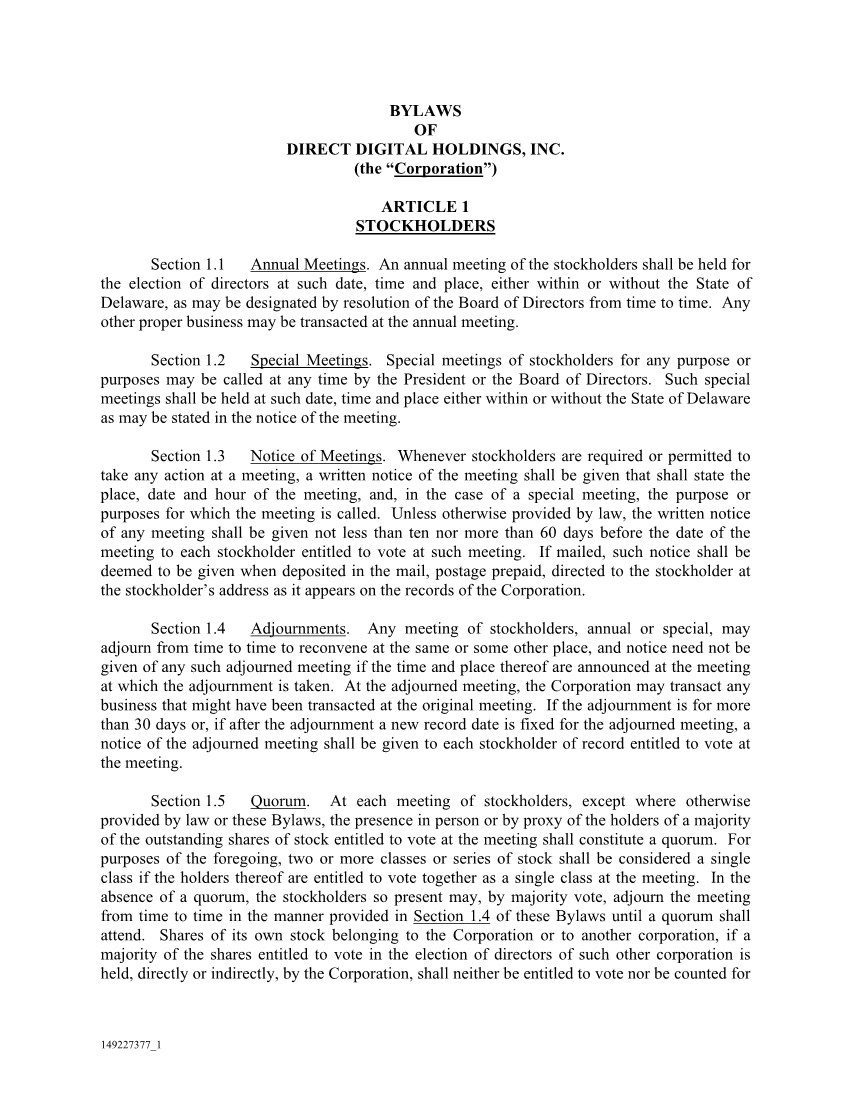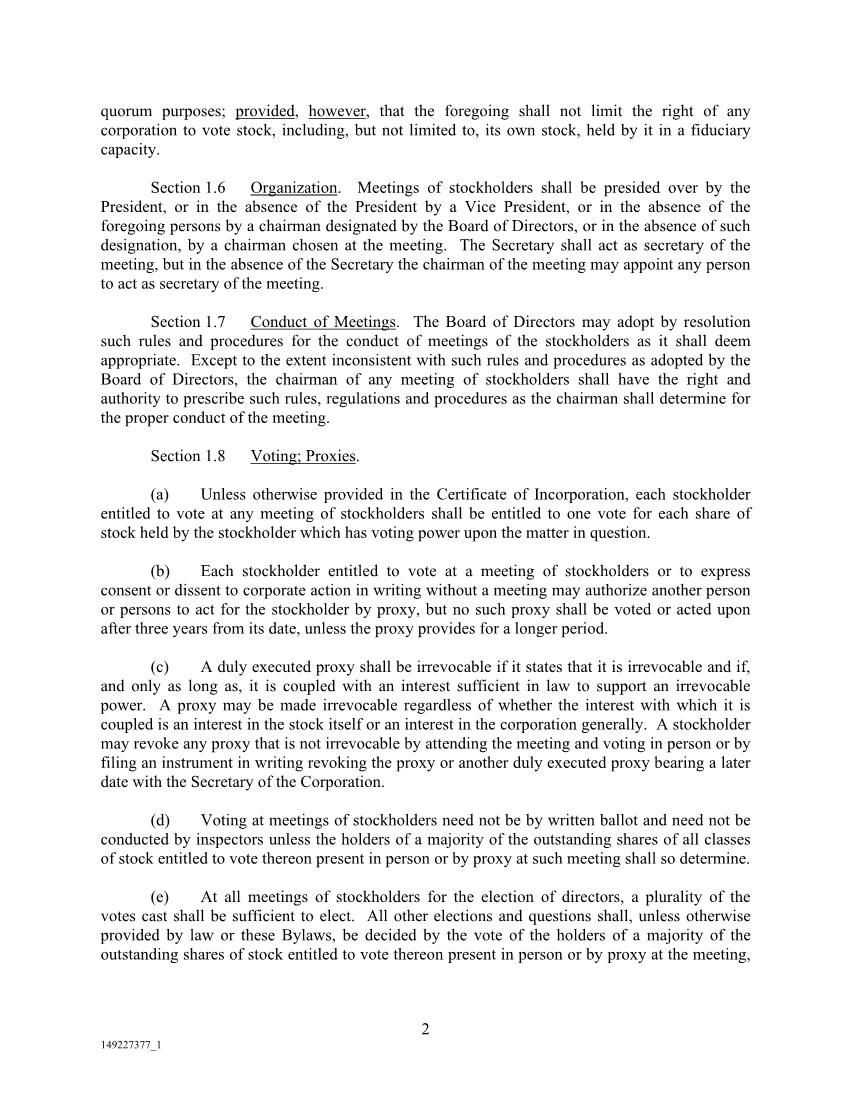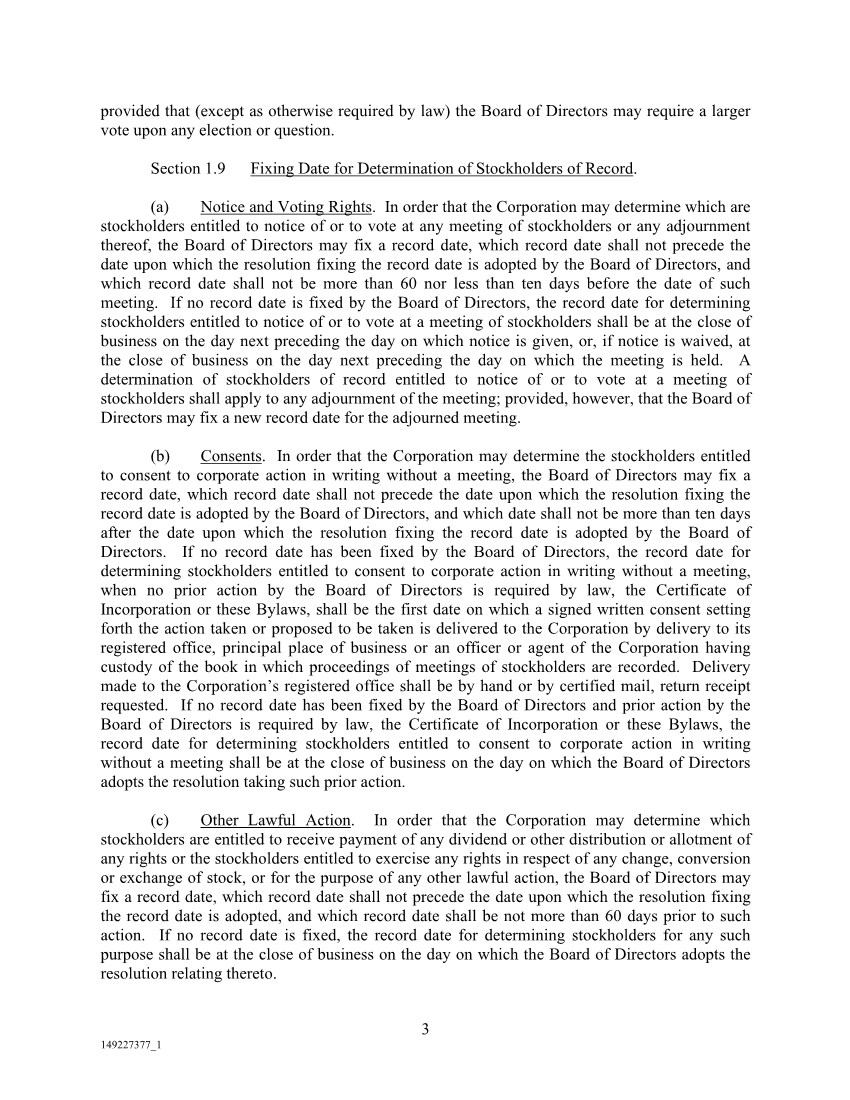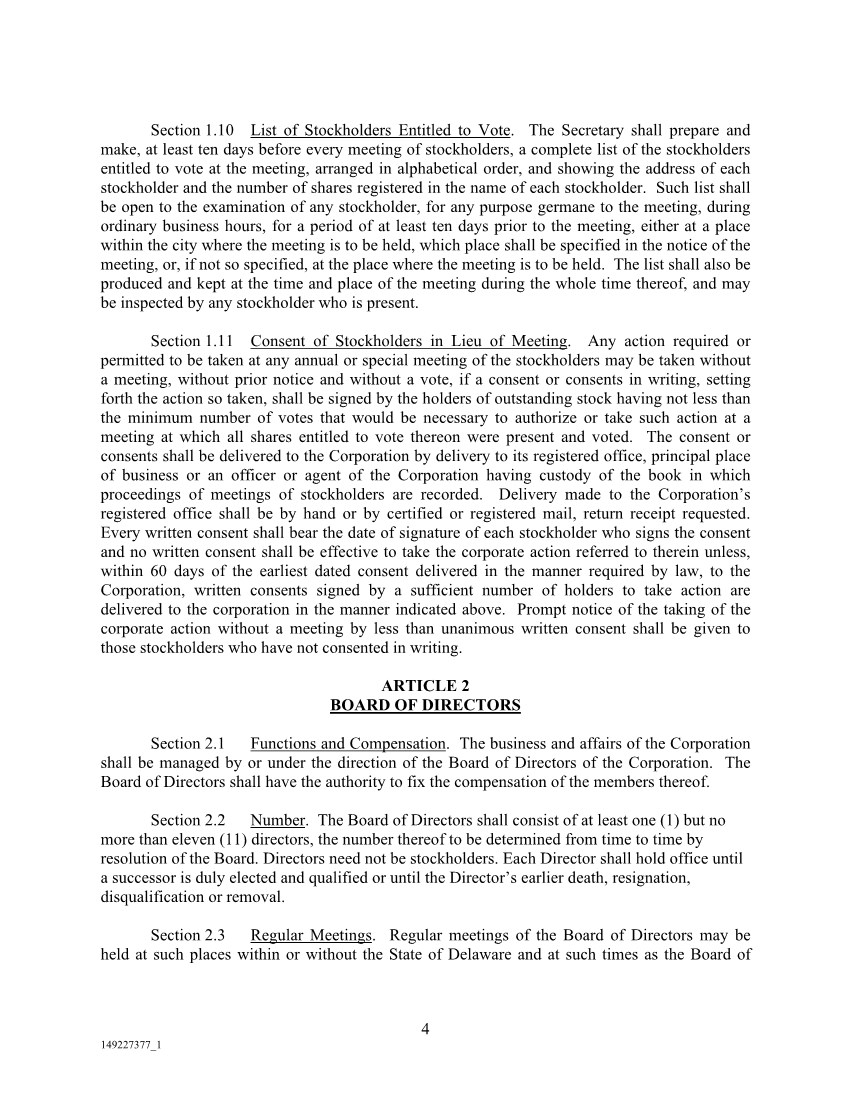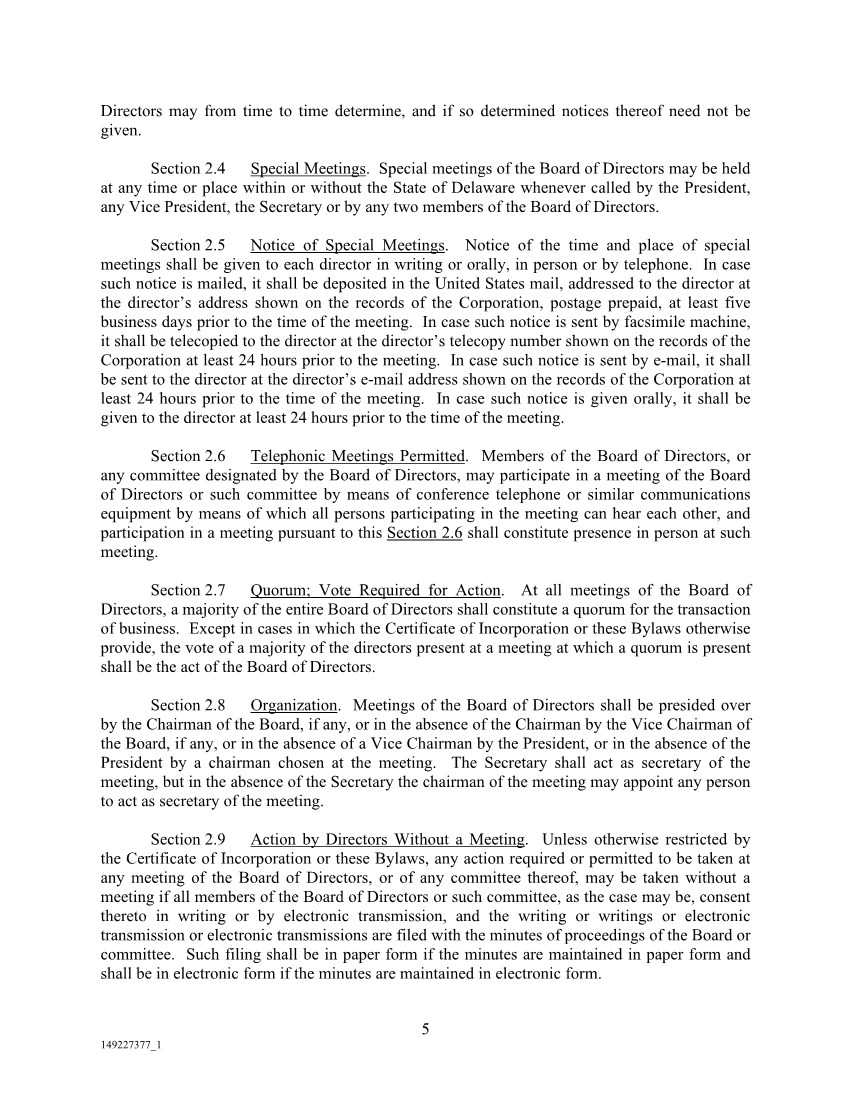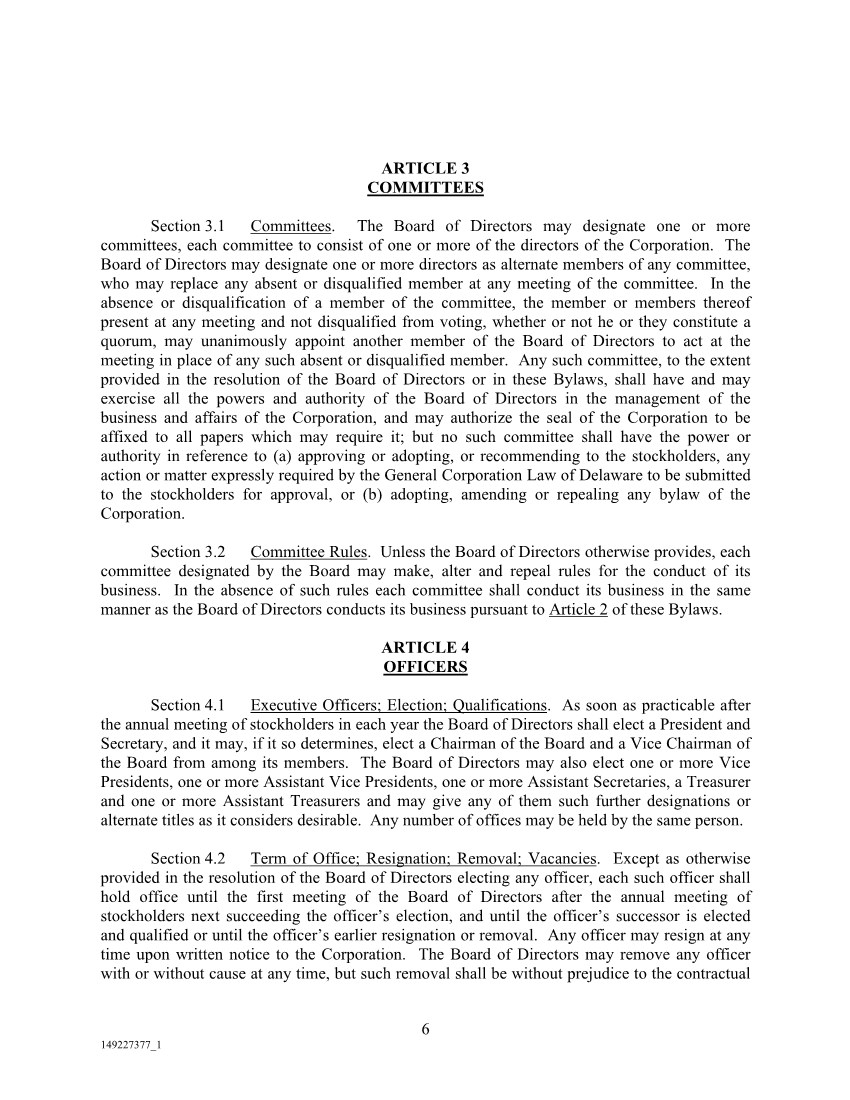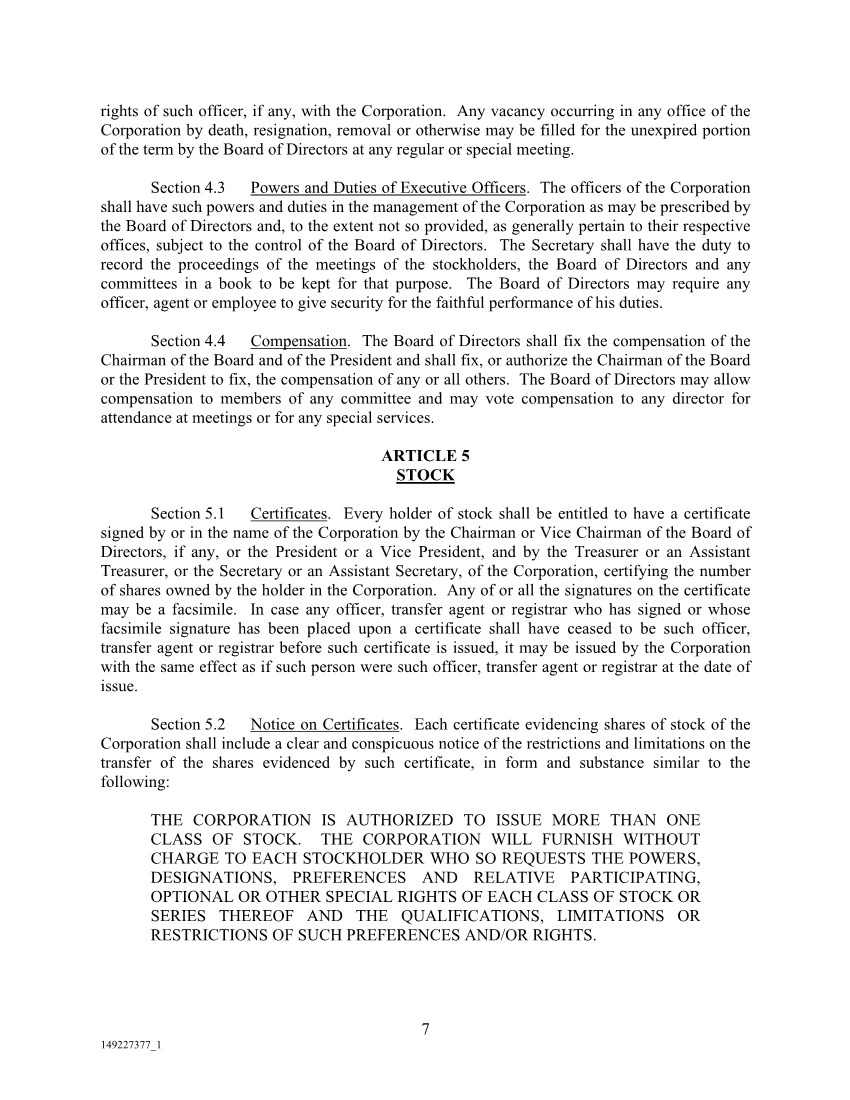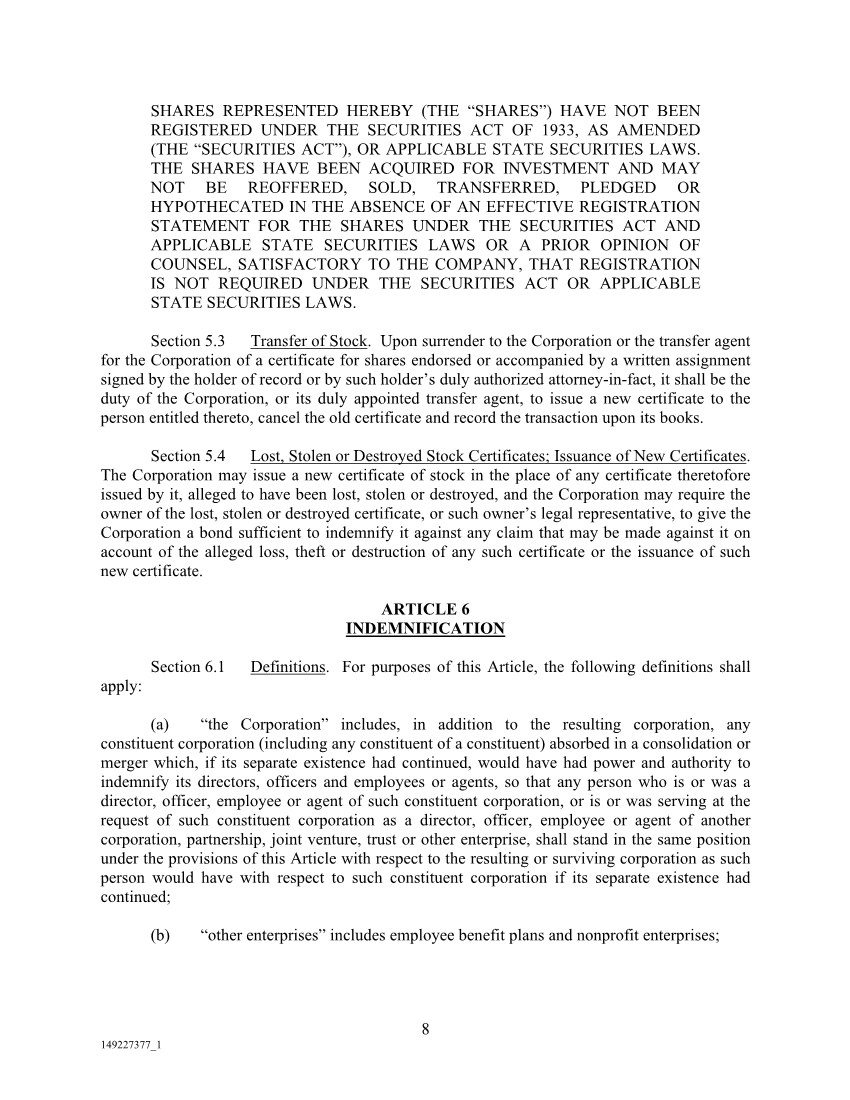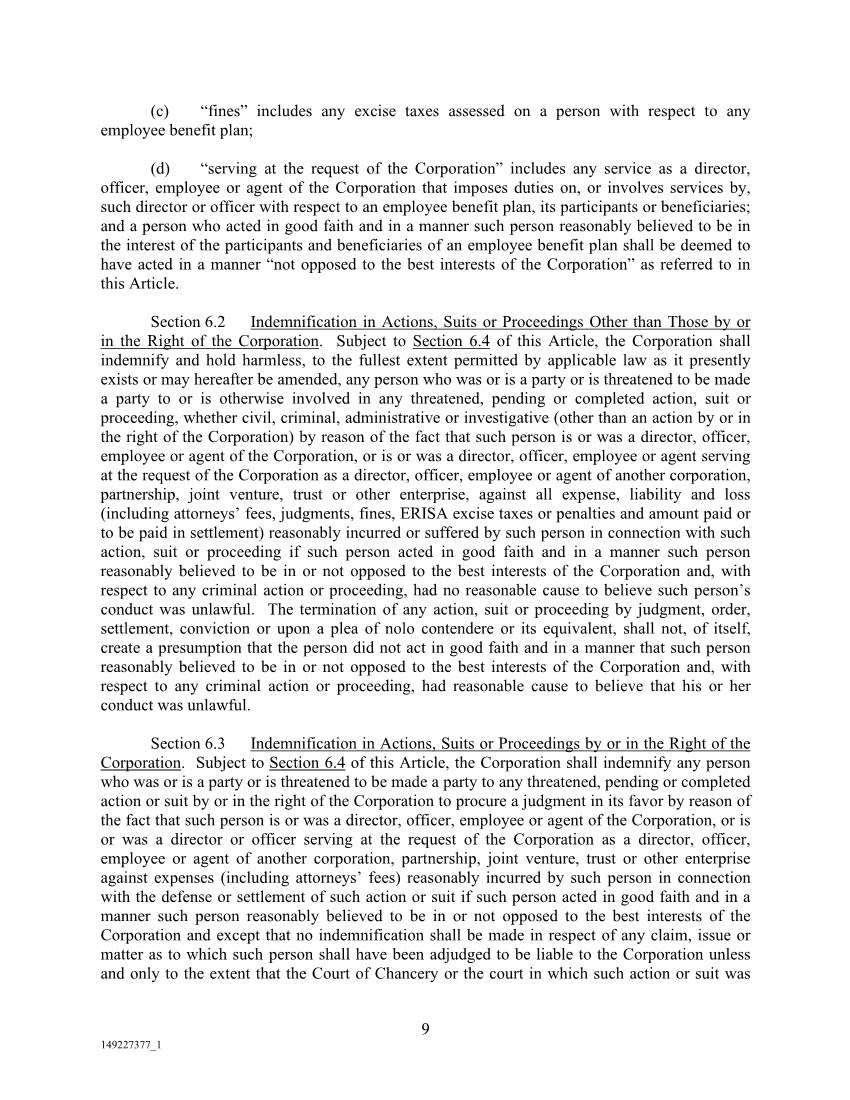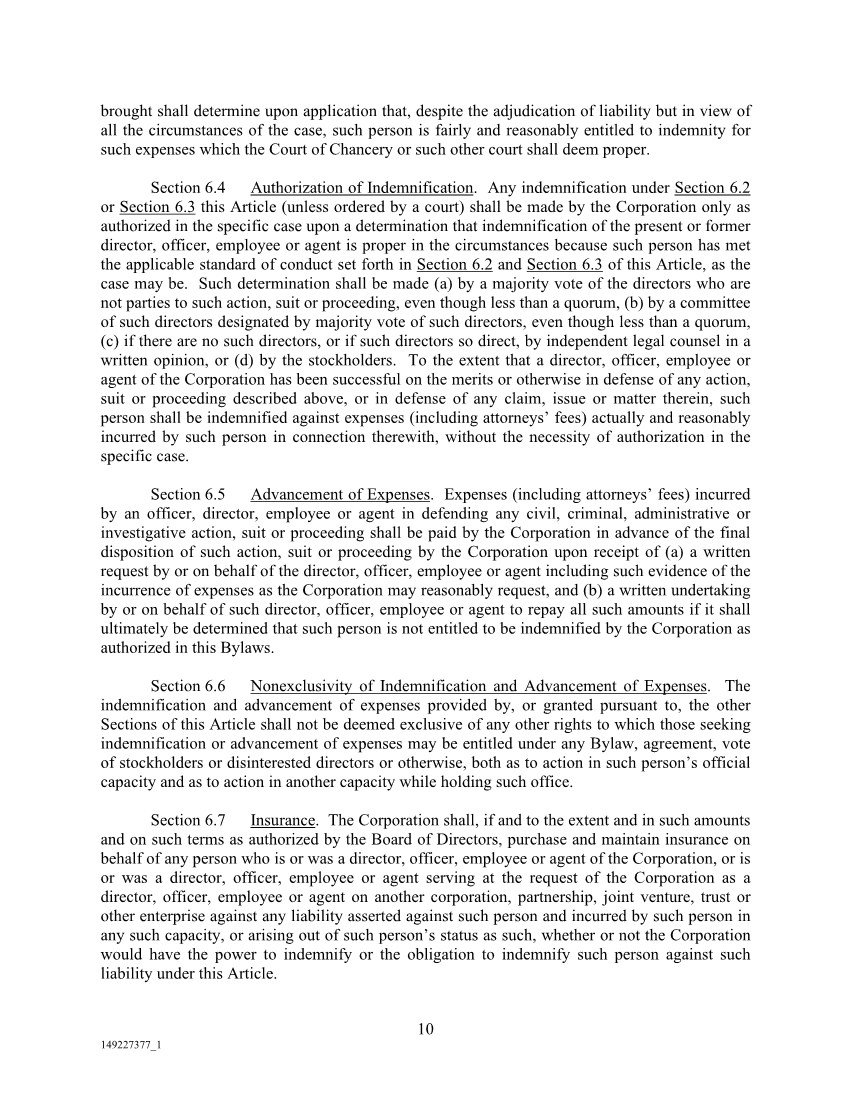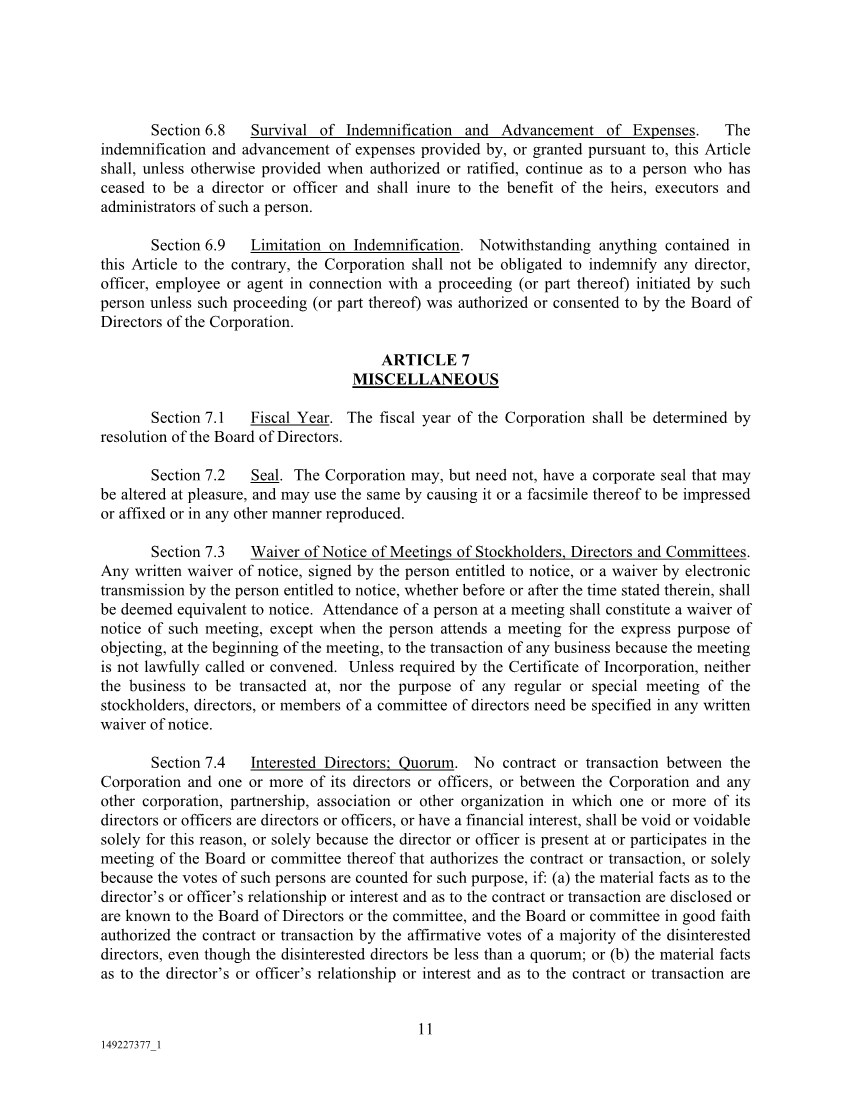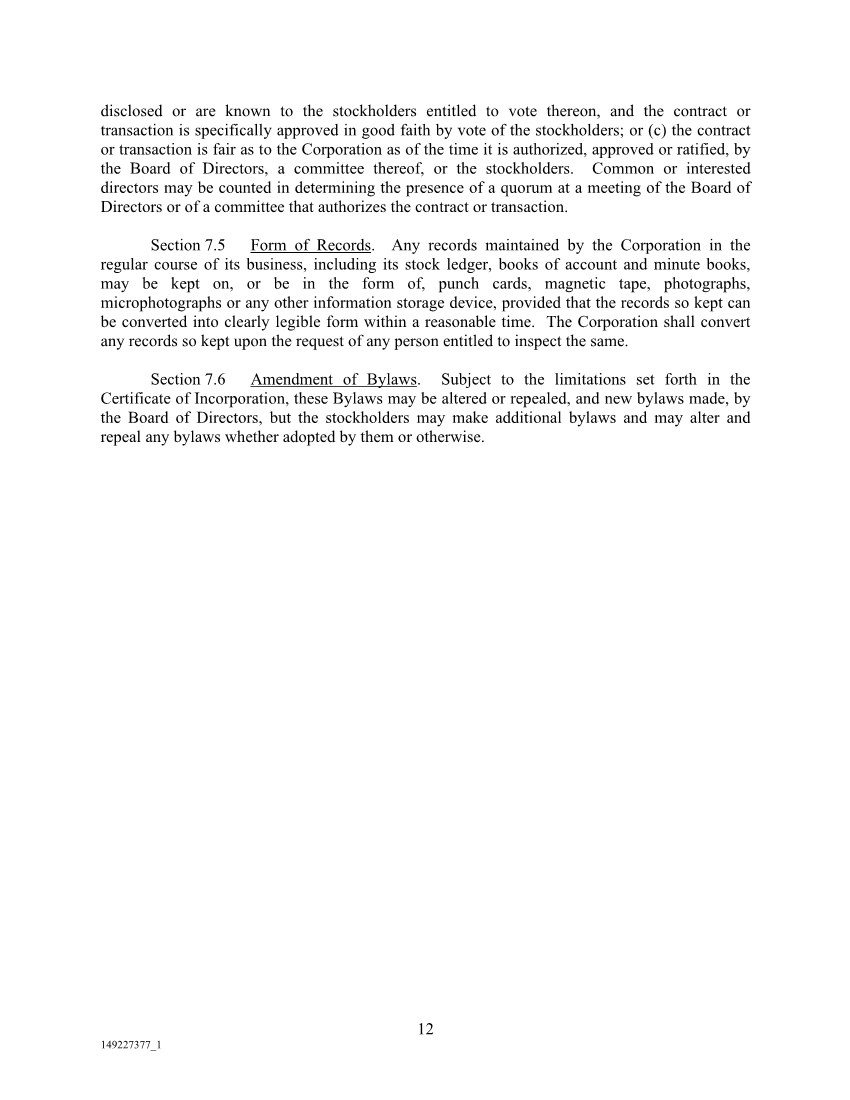| 149227377_1 BYLAWS OF DIRECT DIGITAL HOLDINGS, INC. (the “Corporation”) ARTICLE 1 STOCKHOLDERS Section 1.1 Annual Meetings. An annual meeting of the stockholders shall be held for the election of directors at such date, time and place, either within or without the State of Delaware, as may be designated by resolution of the Board of Directors from time to time. Any other proper business may be transacted at the annual meeting. Section 1.2 Special Meetings. Special meetings of stockholders for any purpose or purposes may be called at any time by the President or the Board of Directors. Such special meetings shall be held at such date, time and place either within or without the State of Delaware as may be stated in the notice of the meeting. Section 1.3 Notice of Meetings. Whenever stockholders are required or permitted to take any action at a meeting, a written notice of the meeting shall be given that shall state the place, date and hour of the meeting, and, in the case of a special meeting, the purpose or purposes for which the meeting is called. Unless otherwise provided by law, the written notice of any meeting shall be given not less than ten nor more than 60 days before the date of the meeting to each stockholder entitled to vote at such meeting. If mailed, such notice shall be deemed to be given when deposited in the mail, postage prepaid, directed to the stockholder at the stockholder’s address as it appears on the records of the Corporation. Section 1.4 Adjournments. Any meeting of stockholders, annual or special, may adjourn from time to time to reconvene at the same or some other place, and notice need not be given of any such adjourned meeting if the time and place thereof are announced at the meeting at which the adjournment is taken. At the adjourned meeting, the Corporation may transact any business that might have been transacted at the original meeting. If the adjournment is for more than 30 days or, if after the adjournment a new record date is fixed for the adjourned meeting, a notice of the adjourned meeting shall be given to each stockholder of record entitled to vote at the meeting. Section 1.5 Quorum. At each meeting of stockholders, except where otherwise provided by law or these Bylaws, the presence in person or by proxy of the holders of a majority of the outstanding shares of stock entitled to vote at the meeting shall constitute a quorum. For purposes of the foregoing, two or more classes or series of stock shall be considered a single class if the holders thereof are entitled to vote together as a single class at the meeting. In the absence of a quorum, the stockholders so present may, by majority vote, adjourn the meeting from time to time in the manner provided in Section 1.4 of these Bylaws until a quorum shall attend. Shares of its own stock belonging to the Corporation or to another corporation, if a majority of the shares entitled to vote in the election of directors of such other corporation is held, directly or indirectly, by the Corporation, shall neither be entitled to vote nor be counted for |
| 149227377_1 2 quorum purposes; provided, however, that the foregoing shall not limit the right of any corporation to vote stock, including, but not limited to, its own stock, held by it in a fiduciary capacity. Section 1.6 Organization. Meetings of stockholders shall be presided over by the President, or in the absence of the President by a Vice President, or in the absence of the foregoing persons by a chairman designated by the Board of Directors, or in the absence of such designation, by a chairman chosen at the meeting. The Secretary shall act as secretary of the meeting, but in the absence of the Secretary the chairman of the meeting may appoint any person to act as secretary of the meeting. Section 1.7 Conduct of Meetings. The Board of Directors may adopt by resolution such rules and procedures for the conduct of meetings of the stockholders as it shall deem appropriate. Except to the extent inconsistent with such rules and procedures as adopted by the Board of Directors, the chairman of any meeting of stockholders shall have the right and authority to prescribe such rules, regulations and procedures as the chairman shall determine for the proper conduct of the meeting. Section 1.8 Voting; Proxies. (a) Unless otherwise provided in the Certificate of Incorporation, each stockholder entitled to vote at any meeting of stockholders shall be entitled to one vote for each share of stock held by the stockholder which has voting power upon the matter in question. (b) Each stockholder entitled to vote at a meeting of stockholders or to express consent or dissent to corporate action in writing without a meeting may authorize another person or persons to act for the stockholder by proxy, but no such proxy shall be voted or acted upon after three years from its date, unless the proxy provides for a longer period. (c) A duly executed proxy shall be irrevocable if it states that it is irrevocable and if, and only as long as, it is coupled with an interest sufficient in law to support an irrevocable power. A proxy may be made irrevocable regardless of whether the interest with which it is coupled is an interest in the stock itself or an interest in the corporation generally. A stockholder may revoke any proxy that is not irrevocable by attending the meeting and voting in person or by filing an instrument in writing revoking the proxy or another duly executed proxy bearing a later date with the Secretary of the Corporation. (d) Voting at meetings of stockholders need not be by written ballot and need not be conducted by inspectors unless the holders of a majority of the outstanding shares of all classes of stock entitled to vote thereon present in person or by proxy at such meeting shall so determine. (e) At all meetings of stockholders for the election of directors, a plurality of the votes cast shall be sufficient to elect. All other elections and questions shall, unless otherwise provided by law or these Bylaws, be decided by the vote of the holders of a majority of the outstanding shares of stock entitled to vote thereon present in person or by proxy at the meeting, |
| 149227377_1 3 provided that (except as otherwise required by law) the Board of Directors may require a larger vote upon any election or question. Section 1.9 Fixing Date for Determination of Stockholders of Record. (a) Notice and Voting Rights. In order that the Corporation may determine which are stockholders entitled to notice of or to vote at any meeting of stockholders or any adjournment thereof, the Board of Directors may fix a record date, which record date shall not precede the date upon which the resolution fixing the record date is adopted by the Board of Directors, and which record date shall not be more than 60 nor less than ten days before the date of such meeting. If no record date is fixed by the Board of Directors, the record date for determining stockholders entitled to notice of or to vote at a meeting of stockholders shall be at the close of business on the day next preceding the day on which notice is given, or, if notice is waived, at the close of business on the day next preceding the day on which the meeting is held. A determination of stockholders of record entitled to notice of or to vote at a meeting of stockholders shall apply to any adjournment of the meeting; provided, however, that the Board of Directors may fix a new record date for the adjourned meeting. (b) Consents. In order that the Corporation may determine the stockholders entitled to consent to corporate action in writing without a meeting, the Board of Directors may fix a record date, which record date shall not precede the date upon which the resolution fixing the record date is adopted by the Board of Directors, and which date shall not be more than ten days after the date upon which the resolution fixing the record date is adopted by the Board of Directors. If no record date has been fixed by the Board of Directors, the record date for determining stockholders entitled to consent to corporate action in writing without a meeting, when no prior action by the Board of Directors is required by law, the Certificate of Incorporation or these Bylaws, shall be the first date on which a signed written consent setting forth the action taken or proposed to be taken is delivered to the Corporation by delivery to its registered office, principal place of business or an officer or agent of the Corporation having custody of the book in which proceedings of meetings of stockholders are recorded. Delivery made to the Corporation’s registered office shall be by hand or by certified mail, return receipt requested. If no record date has been fixed by the Board of Directors and prior action by the Board of Directors is required by law, the Certificate of Incorporation or these Bylaws, the record date for determining stockholders entitled to consent to corporate action in writing without a meeting shall be at the close of business on the day on which the Board of Directors adopts the resolution taking such prior action. (c) Other Lawful Action. In order that the Corporation may determine which stockholders are entitled to receive payment of any dividend or other distribution or allotment of any rights or the stockholders entitled to exercise any rights in respect of any change, conversion or exchange of stock, or for the purpose of any other lawful action, the Board of Directors may fix a record date, which record date shall not precede the date upon which the resolution fixing the record date is adopted, and which record date shall be not more than 60 days prior to such action. If no record date is fixed, the record date for determining stockholders for any such purpose shall be at the close of business on the day on which the Board of Directors adopts the resolution relating thereto. |
| 149227377_1 4 Section 1.10 List of Stockholders Entitled to Vote. The Secretary shall prepare and make, at least ten days before every meeting of stockholders, a complete list of the stockholders entitled to vote at the meeting, arranged in alphabetical order, and showing the address of each stockholder and the number of shares registered in the name of each stockholder. Such list shall be open to the examination of any stockholder, for any purpose germane to the meeting, during ordinary business hours, for a period of at least ten days prior to the meeting, either at a place within the city where the meeting is to be held, which place shall be specified in the notice of the meeting, or, if not so specified, at the place where the meeting is to be held. The list shall also be produced and kept at the time and place of the meeting during the whole time thereof, and may be inspected by any stockholder who is present. Section 1.11 Consent of Stockholders in Lieu of Meeting. Any action required or permitted to be taken at any annual or special meeting of the stockholders may be taken without a meeting, without prior notice and without a vote, if a consent or consents in writing, setting forth the action so taken, shall be signed by the holders of outstanding stock having not less than the minimum number of votes that would be necessary to authorize or take such action at a meeting at which all shares entitled to vote thereon were present and voted. The consent or consents shall be delivered to the Corporation by delivery to its registered office, principal place of business or an officer or agent of the Corporation having custody of the book in which proceedings of meetings of stockholders are recorded. Delivery made to the Corporation’s registered office shall be by hand or by certified or registered mail, return receipt requested. Every written consent shall bear the date of signature of each stockholder who signs the consent and no written consent shall be effective to take the corporate action referred to therein unless, within 60 days of the earliest dated consent delivered in the manner required by law, to the Corporation, written consents signed by a sufficient number of holders to take action are delivered to the corporation in the manner indicated above. Prompt notice of the taking of the corporate action without a meeting by less than unanimous written consent shall be given to those stockholders who have not consented in writing. ARTICLE 2 BOARD OF DIRECTORS Section 2.1 Functions and Compensation. The business and affairs of the Corporation shall be managed by or under the direction of the Board of Directors of the Corporation. The Board of Directors shall have the authority to fix the compensation of the members thereof. Section 2.2 Number. The Board of Directors shall consist of at least one (1) but no more than eleven (11) directors, the number thereof to be determined from time to time by resolution of the Board. Directors need not be stockholders. Each Director shall hold office until a successor is duly elected and qualified or until the Director’s earlier death, resignation, disqualification or removal. Section 2.3 Regular Meetings. Regular meetings of the Board of Directors may be held at such places within or without the State of Delaware and at such times as the Board of |
| 149227377_1 5 Directors may from time to time determine, and if so determined notices thereof need not be given. Section 2.4 Special Meetings. Special meetings of the Board of Directors may be held at any time or place within or without the State of Delaware whenever called by the President, any Vice President, the Secretary or by any two members of the Board of Directors. Section 2.5 Notice of Special Meetings. Notice of the time and place of special meetings shall be given to each director in writing or orally, in person or by telephone. In case such notice is mailed, it shall be deposited in the United States mail, addressed to the director at the director’s address shown on the records of the Corporation, postage prepaid, at least five business days prior to the time of the meeting. In case such notice is sent by facsimile machine, it shall be telecopied to the director at the director’s telecopy number shown on the records of the Corporation at least 24 hours prior to the meeting. In case such notice is sent by e-mail, it shall be sent to the director at the director’s e-mail address shown on the records of the Corporation at least 24 hours prior to the time of the meeting. In case such notice is given orally, it shall be given to the director at least 24 hours prior to the time of the meeting. Section 2.6 Telephonic Meetings Permitted. Members of the Board of Directors, or any committee designated by the Board of Directors, may participate in a meeting of the Board of Directors or such committee by means of conference telephone or similar communications equipment by means of which all persons participating in the meeting can hear each other, and participation in a meeting pursuant to this Section 2.6 shall constitute presence in person at such meeting. Section 2.7 Quorum; Vote Required for Action. At all meetings of the Board of Directors, a majority of the entire Board of Directors shall constitute a quorum for the transaction of business. Except in cases in which the Certificate of Incorporation or these Bylaws otherwise provide, the vote of a majority of the directors present at a meeting at which a quorum is present shall be the act of the Board of Directors. Section 2.8 Organization. Meetings of the Board of Directors shall be presided over by the Chairman of the Board, if any, or in the absence of the Chairman by the Vice Chairman of the Board, if any, or in the absence of a Vice Chairman by the President, or in the absence of the President by a chairman chosen at the meeting. The Secretary shall act as secretary of the meeting, but in the absence of the Secretary the chairman of the meeting may appoint any person to act as secretary of the meeting. Section 2.9 Action by Directors Without a Meeting. Unless otherwise restricted by the Certificate of Incorporation or these Bylaws, any action required or permitted to be taken at any meeting of the Board of Directors, or of any committee thereof, may be taken without a meeting if all members of the Board of Directors or such committee, as the case may be, consent thereto in writing or by electronic transmission, and the writing or writings or electronic transmission or electronic transmissions are filed with the minutes of proceedings of the Board or committee. Such filing shall be in paper form if the minutes are maintained in paper form and shall be in electronic form if the minutes are maintained in electronic form. |
| 149227377_1 6 ARTICLE 3 COMMITTEES Section 3.1 Committees. The Board of Directors may designate one or more committees, each committee to consist of one or more of the directors of the Corporation. The Board of Directors may designate one or more directors as alternate members of any committee, who may replace any absent or disqualified member at any meeting of the committee. In the absence or disqualification of a member of the committee, the member or members thereof present at any meeting and not disqualified from voting, whether or not he or they constitute a quorum, may unanimously appoint another member of the Board of Directors to act at the meeting in place of any such absent or disqualified member. Any such committee, to the extent provided in the resolution of the Board of Directors or in these Bylaws, shall have and may exercise all the powers and authority of the Board of Directors in the management of the business and affairs of the Corporation, and may authorize the seal of the Corporation to be affixed to all papers which may require it; but no such committee shall have the power or authority in reference to (a) approving or adopting, or recommending to the stockholders, any action or matter expressly required by the General Corporation Law of Delaware to be submitted to the stockholders for approval, or (b) adopting, amending or repealing any bylaw of the Corporation. Section 3.2 Committee Rules. Unless the Board of Directors otherwise provides, each committee designated by the Board may make, alter and repeal rules for the conduct of its business. In the absence of such rules each committee shall conduct its business in the same manner as the Board of Directors conducts its business pursuant to Article 2 of these Bylaws. ARTICLE 4 OFFICERS Section 4.1 Executive Officers; Election; Qualifications. As soon as practicable after the annual meeting of stockholders in each year the Board of Directors shall elect a President and Secretary, and it may, if it so determines, elect a Chairman of the Board and a Vice Chairman of the Board from among its members. The Board of Directors may also elect one or more Vice Presidents, one or more Assistant Vice Presidents, one or more Assistant Secretaries, a Treasurer and one or more Assistant Treasurers and may give any of them such further designations or alternate titles as it considers desirable. Any number of offices may be held by the same person. Section 4.2 Term of Office; Resignation; Removal; Vacancies. Except as otherwise provided in the resolution of the Board of Directors electing any officer, each such officer shall hold office until the first meeting of the Board of Directors after the annual meeting of stockholders next succeeding the officer’s election, and until the officer’s successor is elected and qualified or until the officer’s earlier resignation or removal. Any officer may resign at any time upon written notice to the Corporation. The Board of Directors may remove any officer with or without cause at any time, but such removal shall be without prejudice to the contractual |
| 149227377_1 7 rights of such officer, if any, with the Corporation. Any vacancy occurring in any office of the Corporation by death, resignation, removal or otherwise may be filled for the unexpired portion of the term by the Board of Directors at any regular or special meeting. Section 4.3 Powers and Duties of Executive Officers. The officers of the Corporation shall have such powers and duties in the management of the Corporation as may be prescribed by the Board of Directors and, to the extent not so provided, as generally pertain to their respective offices, subject to the control of the Board of Directors. The Secretary shall have the duty to record the proceedings of the meetings of the stockholders, the Board of Directors and any committees in a book to be kept for that purpose. The Board of Directors may require any officer, agent or employee to give security for the faithful performance of his duties. Section 4.4 Compensation. The Board of Directors shall fix the compensation of the Chairman of the Board and of the President and shall fix, or authorize the Chairman of the Board or the President to fix, the compensation of any or all others. The Board of Directors may allow compensation to members of any committee and may vote compensation to any director for attendance at meetings or for any special services. ARTICLE 5 STOCK Section 5.1 Certificates. Every holder of stock shall be entitled to have a certificate signed by or in the name of the Corporation by the Chairman or Vice Chairman of the Board of Directors, if any, or the President or a Vice President, and by the Treasurer or an Assistant Treasurer, or the Secretary or an Assistant Secretary, of the Corporation, certifying the number of shares owned by the holder in the Corporation. Any of or all the signatures on the certificate may be a facsimile. In case any officer, transfer agent or registrar who has signed or whose facsimile signature has been placed upon a certificate shall have ceased to be such officer, transfer agent or registrar before such certificate is issued, it may be issued by the Corporation with the same effect as if such person were such officer, transfer agent or registrar at the date of issue. Section 5.2 Notice on Certificates. Each certificate evidencing shares of stock of the Corporation shall include a clear and conspicuous notice of the restrictions and limitations on the transfer of the shares evidenced by such certificate, in form and substance similar to the following: THE CORPORATION IS AUTHORIZED TO ISSUE MORE THAN ONE CLASS OF STOCK. THE CORPORATION WILL FURNISH WITHOUT CHARGE TO EACH STOCKHOLDER WHO SO REQUESTS THE POWERS, DESIGNATIONS, PREFERENCES AND RELATIVE PARTICIPATING, OPTIONAL OR OTHER SPECIAL RIGHTS OF EACH CLASS OF STOCK OR SERIES THEREOF AND THE QUALIFICATIONS, LIMITATIONS OR RESTRICTIONS OF SUCH PREFERENCES AND/OR RIGHTS. |
| 149227377_1 8 SHARES REPRESENTED HEREBY (THE “SHARES”) HAVE NOT BEEN REGISTERED UNDER THE SECURITIES ACT OF 1933, AS AMENDED (THE “SECURITIES ACT”), OR APPLICABLE STATE SECURITIES LAWS. THE SHARES HAVE BEEN ACQUIRED FOR INVESTMENT AND MAY NOT BE REOFFERED, SOLD, TRANSFERRED, PLEDGED OR HYPOTHECATED IN THE ABSENCE OF AN EFFECTIVE REGISTRATION STATEMENT FOR THE SHARES UNDER THE SECURITIES ACT AND APPLICABLE STATE SECURITIES LAWS OR A PRIOR OPINION OF COUNSEL, SATISFACTORY TO THE COMPANY, THAT REGISTRATION IS NOT REQUIRED UNDER THE SECURITIES ACT OR APPLICABLE STATE SECURITIES LAWS. Section 5.3 Transfer of Stock. Upon surrender to the Corporation or the transfer agent for the Corporation of a certificate for shares endorsed or accompanied by a written assignment signed by the holder of record or by such holder’s duly authorized attorney-in-fact, it shall be the duty of the Corporation, or its duly appointed transfer agent, to issue a new certificate to the person entitled thereto, cancel the old certificate and record the transaction upon its books. Section 5.4 Lost, Stolen or Destroyed Stock Certificates; Issuance of New Certificates. The Corporation may issue a new certificate of stock in the place of any certificate theretofore issued by it, alleged to have been lost, stolen or destroyed, and the Corporation may require the owner of the lost, stolen or destroyed certificate, or such owner’s legal representative, to give the Corporation a bond sufficient to indemnify it against any claim that may be made against it on account of the alleged loss, theft or destruction of any such certificate or the issuance of such new certificate. ARTICLE 6 INDEMNIFICATION Section 6.1 Definitions. For purposes of this Article, the following definitions shall apply: (a) “the Corporation” includes, in addition to the resulting corporation, any constituent corporation (including any constituent of a constituent) absorbed in a consolidation or merger which, if its separate existence had continued, would have had power and authority to indemnify its directors, officers and employees or agents, so that any person who is or was a director, officer, employee or agent of such constituent corporation, or is or was serving at the request of such constituent corporation as a director, officer, employee or agent of another corporation, partnership, joint venture, trust or other enterprise, shall stand in the same position under the provisions of this Article with respect to the resulting or surviving corporation as such person would have with respect to such constituent corporation if its separate existence had continued; (b) “other enterprises” includes employee benefit plans and nonprofit enterprises; |
| 149227377_1 9 (c) “fines” includes any excise taxes assessed on a person with respect to any employee benefit plan; (d) “serving at the request of the Corporation” includes any service as a director, officer, employee or agent of the Corporation that imposes duties on, or involves services by, such director or officer with respect to an employee benefit plan, its participants or beneficiaries; and a person who acted in good faith and in a manner such person reasonably believed to be in the interest of the participants and beneficiaries of an employee benefit plan shall be deemed to have acted in a manner “not opposed to the best interests of the Corporation” as referred to in this Article. Section 6.2 Indemnification in Actions, Suits or Proceedings Other than Those by or in the Right of the Corporation. Subject to Section 6.4 of this Article, the Corporation shall indemnify and hold harmless, to the fullest extent permitted by applicable law as it presently exists or may hereafter be amended, any person who was or is a party or is threatened to be made a party to or is otherwise involved in any threatened, pending or completed action, suit or proceeding, whether civil, criminal, administrative or investigative (other than an action by or in the right of the Corporation) by reason of the fact that such person is or was a director, officer, employee or agent of the Corporation, or is or was a director, officer, employee or agent serving at the request of the Corporation as a director, officer, employee or agent of another corporation, partnership, joint venture, trust or other enterprise, against all expense, liability and loss (including attorneys’ fees, judgments, fines, ERISA excise taxes or penalties and amount paid or to be paid in settlement) reasonably incurred or suffered by such person in connection with such action, suit or proceeding if such person acted in good faith and in a manner such person reasonably believed to be in or not opposed to the best interests of the Corporation and, with respect to any criminal action or proceeding, had no reasonable cause to believe such person’s conduct was unlawful. The termination of any action, suit or proceeding by judgment, order, settlement, conviction or upon a plea of nolo contendere or its equivalent, shall not, of itself, create a presumption that the person did not act in good faith and in a manner that such person reasonably believed to be in or not opposed to the best interests of the Corporation and, with respect to any criminal action or proceeding, had reasonable cause to believe that his or her conduct was unlawful. Section 6.3 Indemnification in Actions, Suits or Proceedings by or in the Right of the Corporation. Subject to Section 6.4 of this Article, the Corporation shall indemnify any person who was or is a party or is threatened to be made a party to any threatened, pending or completed action or suit by or in the right of the Corporation to procure a judgment in its favor by reason of the fact that such person is or was a director, officer, employee or agent of the Corporation, or is or was a director or officer serving at the request of the Corporation as a director, officer, employee or agent of another corporation, partnership, joint venture, trust or other enterprise against expenses (including attorneys’ fees) reasonably incurred by such person in connection with the defense or settlement of such action or suit if such person acted in good faith and in a manner such person reasonably believed to be in or not opposed to the best interests of the Corporation and except that no indemnification shall be made in respect of any claim, issue or matter as to which such person shall have been adjudged to be liable to the Corporation unless and only to the extent that the Court of Chancery or the court in which such action or suit was |
| 149227377_1 10 brought shall determine upon application that, despite the adjudication of liability but in view of all the circumstances of the case, such person is fairly and reasonably entitled to indemnity for such expenses which the Court of Chancery or such other court shall deem proper. Section 6.4 Authorization of Indemnification. Any indemnification under Section 6.2 or Section 6.3 this Article (unless ordered by a court) shall be made by the Corporation only as authorized in the specific case upon a determination that indemnification of the present or former director, officer, employee or agent is proper in the circumstances because such person has met the applicable standard of conduct set forth in Section 6.2 and Section 6.3 of this Article, as the case may be. Such determination shall be made (a) by a majority vote of the directors who are not parties to such action, suit or proceeding, even though less than a quorum, (b) by a committee of such directors designated by majority vote of such directors, even though less than a quorum, (c) if there are no such directors, or if such directors so direct, by independent legal counsel in a written opinion, or (d) by the stockholders. To the extent that a director, officer, employee or agent of the Corporation has been successful on the merits or otherwise in defense of any action, suit or proceeding described above, or in defense of any claim, issue or matter therein, such person shall be indemnified against expenses (including attorneys’ fees) actually and reasonably incurred by such person in connection therewith, without the necessity of authorization in the specific case. Section 6.5 Advancement of Expenses. Expenses (including attorneys’ fees) incurred by an officer, director, employee or agent in defending any civil, criminal, administrative or investigative action, suit or proceeding shall be paid by the Corporation in advance of the final disposition of such action, suit or proceeding by the Corporation upon receipt of (a) a written request by or on behalf of the director, officer, employee or agent including such evidence of the incurrence of expenses as the Corporation may reasonably request, and (b) a written undertaking by or on behalf of such director, officer, employee or agent to repay all such amounts if it shall ultimately be determined that such person is not entitled to be indemnified by the Corporation as authorized in this Bylaws. Section 6.6 Nonexclusivity of Indemnification and Advancement of Expenses. The indemnification and advancement of expenses provided by, or granted pursuant to, the other Sections of this Article shall not be deemed exclusive of any other rights to which those seeking indemnification or advancement of expenses may be entitled under any Bylaw, agreement, vote of stockholders or disinterested directors or otherwise, both as to action in such person’s official capacity and as to action in another capacity while holding such office. Section 6.7 Insurance. The Corporation shall, if and to the extent and in such amounts and on such terms as authorized by the Board of Directors, purchase and maintain insurance on behalf of any person who is or was a director, officer, employee or agent of the Corporation, or is or was a director, officer, employee or agent serving at the request of the Corporation as a director, officer, employee or agent on another corporation, partnership, joint venture, trust or other enterprise against any liability asserted against such person and incurred by such person in any such capacity, or arising out of such person’s status as such, whether or not the Corporation would have the power to indemnify or the obligation to indemnify such person against such liability under this Article. |
| 149227377_1 11 Section 6.8 Survival of Indemnification and Advancement of Expenses. The indemnification and advancement of expenses provided by, or granted pursuant to, this Article shall, unless otherwise provided when authorized or ratified, continue as to a person who has ceased to be a director or officer and shall inure to the benefit of the heirs, executors and administrators of such a person. Section 6.9 Limitation on Indemnification. Notwithstanding anything contained in this Article to the contrary, the Corporation shall not be obligated to indemnify any director, officer, employee or agent in connection with a proceeding (or part thereof) initiated by such person unless such proceeding (or part thereof) was authorized or consented to by the Board of Directors of the Corporation. ARTICLE 7 MISCELLANEOUS Section 7.1 Fiscal Year. The fiscal year of the Corporation shall be determined by resolution of the Board of Directors. Section 7.2 Seal. The Corporation may, but need not, have a corporate seal that may be altered at pleasure, and may use the same by causing it or a facsimile thereof to be impressed or affixed or in any other manner reproduced. Section 7.3 Waiver of Notice of Meetings of Stockholders, Directors and Committees. Any written waiver of notice, signed by the person entitled to notice, or a waiver by electronic transmission by the person entitled to notice, whether before or after the time stated therein, shall be deemed equivalent to notice. Attendance of a person at a meeting shall constitute a waiver of notice of such meeting, except when the person attends a meeting for the express purpose of objecting, at the beginning of the meeting, to the transaction of any business because the meeting is not lawfully called or convened. Unless required by the Certificate of Incorporation, neither the business to be transacted at, nor the purpose of any regular or special meeting of the stockholders, directors, or members of a committee of directors need be specified in any written waiver of notice. Section 7.4 Interested Directors; Quorum. No contract or transaction between the Corporation and one or more of its directors or officers, or between the Corporation and any other corporation, partnership, association or other organization in which one or more of its directors or officers are directors or officers, or have a financial interest, shall be void or voidable solely for this reason, or solely because the director or officer is present at or participates in the meeting of the Board or committee thereof that authorizes the contract or transaction, or solely because the votes of such persons are counted for such purpose, if: (a) the material facts as to the director’s or officer’s relationship or interest and as to the contract or transaction are disclosed or are known to the Board of Directors or the committee, and the Board or committee in good faith authorized the contract or transaction by the affirmative votes of a majority of the disinterested directors, even though the disinterested directors be less than a quorum; or (b) the material facts as to the director’s or officer’s relationship or interest and as to the contract or transaction are |
| 149227377_1 12 disclosed or are known to the stockholders entitled to vote thereon, and the contract or transaction is specifically approved in good faith by vote of the stockholders; or (c) the contract or transaction is fair as to the Corporation as of the time it is authorized, approved or ratified, by the Board of Directors, a committee thereof, or the stockholders. Common or interested directors may be counted in determining the presence of a quorum at a meeting of the Board of Directors or of a committee that authorizes the contract or transaction. Section 7.5 Form of Records. Any records maintained by the Corporation in the regular course of its business, including its stock ledger, books of account and minute books, may be kept on, or be in the form of, punch cards, magnetic tape, photographs, microphotographs or any other information storage device, provided that the records so kept can be converted into clearly legible form within a reasonable time. The Corporation shall convert any records so kept upon the request of any person entitled to inspect the same. Section 7.6 Amendment of Bylaws. Subject to the limitations set forth in the Certificate of Incorporation, these Bylaws may be altered or repealed, and new bylaws made, by the Board of Directors, but the stockholders may make additional bylaws and may alter and repeal any bylaws whether adopted by them or otherwise. |
